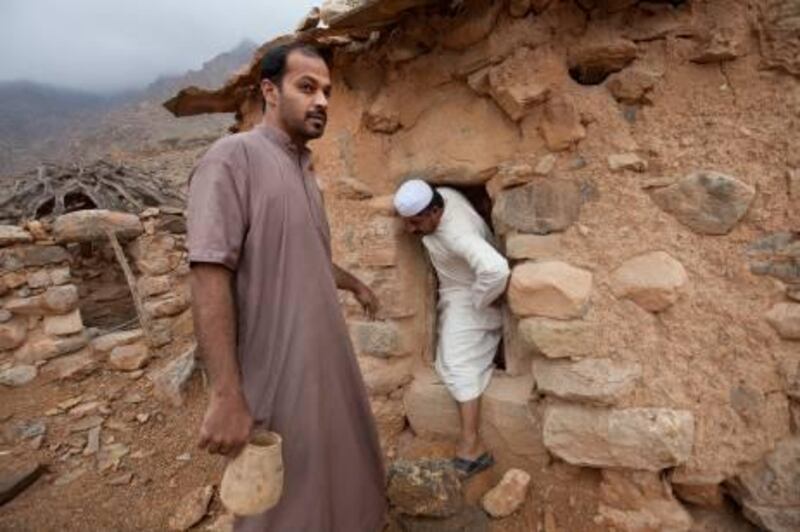FUJAIRAH // The town of Wamm is clearly marked on any map, but to find the original takes looking a little farther up the mountainous terrain of Dibba.
With its homes constructed from the same rocks as the mountain, and its roofs made from the trees that grow along it, the 100-year-old village is easy to miss at first glance.
MORE UAE NEWS: Our pick of today's top local news stories
UAE justice system ranked about US in annual index The UAE justice system has been ranked first in the Middle East and 13th in the world by annual study. Read article
British expatriate tax plans explained Tax experts explain a proposal that would require British nationals in the UAE to pay income tax back home. Read article
Nice wall, but where are the rooms? Modern icons: The UAE has been described as the modern architect's playground with new landmark buildings springing up across the country. Today we take a look at how the Dunes Hotel Apartments became a reality. Read article
[ MORE UAE NEWS ]
On a closer look, the old village that was once known as Qaryat al asal (honey village) for its abundance in honey is still gently pulsating with life - if not the buzzing hive of activity it once was.
"When we left, the bees left," said Abu Abdullah Al Hufayti, who used to sell and live on the honey collected from the mountain bees.
He is a member of the Al Hufayti mountain tribe who called the old village of Wamm home until the early 1980s. That is when the village's 40-plus families were each given modern homes by the Government - and gentle encouragement to leave the "old way" of life behind. They did not have to move far, as their new homes were built at the bottom of the old village.
Still, 60-year-old Mr Abu Abdullah never severed ties with his ancestral home. He still comes to visit his herd of goats on a daily basis. "They are safe here, away from the roads and people," he said.
When he was younger, he would spend more than an hour walking from his modern home below to his old one in the mountains. Now, he drives up the uneven rocky road in his yellow open-backed car.
Each family of the tribes still owns a rectangular one-room house in the village. The dwellings are more than two metres high and just six by two metres wide.
Known as yanz, the dwellings were mainly used for sleeping and storing personal objects including clothes and pottery. Just outside the yanz is a small circular room, or asha, a kitchen with a fireplace and wheat grinder big enough for one person. Each house also has a courtyard walled in by piles of rocks and a place of shelter for the animals.
"The goats would roam about and when it was time to sleep, they all went separate ways to their proper caretakers inside their own sleeping quarters," said Mr Abu Abdullah.
There were also cows, chickens and dogs kept by the tribe. Each house had its own garden of seasonal fruits and vegetables, such as watermelon and cucumbers.
In the 1970s, one kilogram of honey sold for between Dh20 and Dh50, and the tribe lived on the honey itself as well as the proceeds.
"Before, one dirham would go a long way," said a former resident, Rashid Al Hufayti.
He came with his cousin Hassan to collect fresh water from the Wamm spring near the old village. Such outings are among the few times the cousins put aside the demands of modern life and make time for each other these days.
"It tastes better and is healthier than bottled water," said Rashid.
Both Rashid, 36, and Hassan, 40, were born in Wamm village, so they make a point of maintaining and locking up their childhood homes.
Last year, someone broke into Rashid's old home and stole items, including pottery and dalla - a traditional coffee pot. Many of the homes have fallen victim to neglect, as well as the theft of mementos, even some of the homes' small wooden doors have been taken.
"But they left this behind," said Rashid, smiling as he picked up a small traditional sandal, a neaal, he once wore as a child.
"We used to lose many of those whenever we played," he said. "We would get up with dawn, run around with the animals and help out with the chores, like carrying water with our mothers or herding the goats, and then fall asleep by sunset. By the age of four, we had responsibilities. Unlike children of today."
As a father of 10, Rashid has tried to instil some "love" for the mountain in his own children, but without success. "They don't understand why we keep coming back."
Both Rashid and Hassan, who are in the army, attribute their strength to growing up on "milk and honey".
"We were all much thinner while we lived up here," said Hassan, pointing to the small narrow doorways of the houses.
While the men of the tribe remain nostalgic to an old way of life, especially to those times when the families would sit together by the fireplace, they admit it is not the same for the women. "It was tough on the women, they did everything while we went away to sell our honey and produce," said Rashid. "They don't miss these traditional homes."
Rashid and Hassan believe that as long as those who were born in the village are around, it will not be forgotten completely. "But afterwards, there will be no Wamm village, just the town that looks like every other town," said Rashid.






